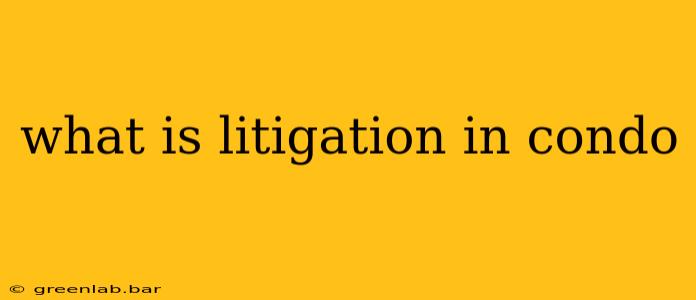Condominium living, while offering a sense of community and convenience, can sometimes lead to disagreements and disputes among residents and the condo association. When these disputes can't be resolved through mediation or other less formal methods, litigation—the process of taking legal action—may become necessary. This article explores what condo litigation entails, the common causes of such disputes, and what homeowners should know to protect themselves.
Common Causes of Condo Litigation
Several issues frequently lead to litigation in condo settings. Understanding these common causes can help prevent disputes or prepare you for potential legal action.
1. Assessment Disputes:
- High assessments: Residents may challenge assessments deemed excessive or unjustified, especially if the association lacks transparency in its financial management. This can involve questioning how funds are spent or alleging mismanagement of condo fees.
- Delinquent fees: Conversely, the condo association might sue owners for unpaid assessments, leading to potential liens on the property and even foreclosure in extreme cases.
2. Bylaw and Rule Violations:
- Enforcement of rules: Disputes arise when the condo association enforces rules perceived as unfair, unreasonable, or inconsistently applied. This could involve issues like pet ownership, noise complaints, parking violations, or renovations.
- Challenges to bylaws: Residents may challenge the legality or enforceability of specific bylaws, arguing they are discriminatory or violate local or state laws.
3. Construction Defects and Repairs:
- Maintenance issues: Disputes often emerge over responsibility for repairs and maintenance of common areas or individual units, particularly concerning significant structural damage or aging infrastructure. Determining liability can be complex and often ends up in court.
- Negligence: If the condo association is deemed negligent in maintaining the property, leading to damage or injury, residents may initiate legal action for compensation.
4. Board of Directors Disputes:
- Election challenges: Disputes can arise during board elections, involving allegations of fraud, improper procedures, or conflicts of interest.
- Mismanagement allegations: Serious allegations of financial mismanagement, breaches of fiduciary duty, or self-dealing by board members can lead to lawsuits seeking accountability.
The Litigation Process in Condo Disputes
Condo litigation generally follows these steps:
- Demand Letter: A formal letter outlining the issue and the desired resolution is sent to the opposing party.
- Negotiation and Mediation: Attempts are made to resolve the dispute outside of court through negotiation or mediation.
- Filing a Lawsuit: If negotiations fail, a lawsuit is filed in the appropriate court, outlining the claims and the relief sought.
- Discovery: Both parties gather evidence through depositions, interrogatories, and document requests.
- Trial: If a settlement isn't reached, the case proceeds to trial, where a judge or jury decides the outcome.
Protecting Yourself from Condo Litigation
Several proactive measures can help minimize the risk of litigation:
- Thoroughly review the condo bylaws and rules: Understanding your rights and responsibilities is crucial.
- Maintain open communication with the condo association: Addressing concerns early can prevent escalation.
- Document everything: Keep records of all communications, payments, and repairs.
- Seek legal counsel early: If a dispute arises, consulting with a lawyer specializing in condo law is essential.
Conclusion: Navigating the Complexities of Condo Litigation
Condo litigation is a complex and potentially costly process. While it's not always avoidable, understanding the common causes of disputes, the legal process, and the steps you can take to protect yourself can significantly improve your chances of a favorable outcome or help prevent legal action altogether. Remember, proactive communication and a thorough understanding of your rights as a condo owner are your best defenses. If you are facing a condo dispute, seeking legal advice is strongly recommended.

